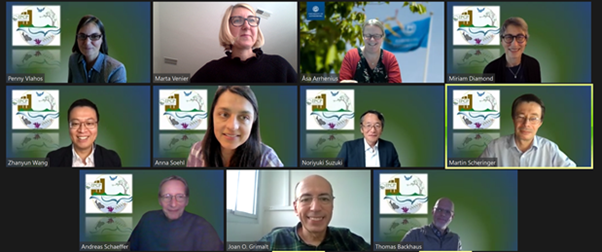MODEL LETTER TO POLICYMAKERS:
In response to inquiries from other scientists, we have posted model letters (in English, Arabic, Chinese, French, German, and Spanish) that others are welcome to use to send to their Ministers and other policymakers requesting that their governments support Costa Rica, Ghana, Mali, Switzerland, United Kingdom of Great Britain and Northern Ireland, and Uruguay’s draft UNEA5.2 resolution calling for an intergovernmental science-policy body for chemicals, waste and pollution.
We suggest sending these letters after early January 2022.
Please write to us at admin(-at-)ipcp.ch:
- To let us know that you have sent your letter
- To provide additional sample letters to share, especially in languages other than English.
WORKSHOP RECORDING (FULL):
BACKGROUND:
Chemical pollution is a serious global environmental problem next to climate change and biodiversity loss. Despite numerous efforts to curtail and regulate chemicals and waste, major problems and global challenges remain.
One grand challenge is the gap between science and policy-making. To address this, Switzerland and other UN Member States have proposed a draft resolution to establish a global science-policy body on chemicals and waste, akin to the Intergovernmental Panel on Climate Change (IPCC) and Intergovernmental Science-Policy Platform on Biodiversity and Ecosystem Services (IPBES). This proposal will be discussed at the upcoming February 2022 session of the United Nations Environment Assembly, UNEA5.2.
In light of this development, our workshop aims to create new momentum on recognizing the global threat of chemical pollution and inspire ambition to take immediate actions on grand challenges.
We are delighted to have authoritative experts, including a representative from the Government of Switzerland, share their views, followed by a moderated panel discussion soliciting ideas from the participants. The workshop builds on a recent Science article (free-access is provided here) and the sign-on campaign that attracted more than 1850 signatures from over 80 countries, where we called for the establishment of a global science-policy body on chemicals and waste.
IN THE PRESS:
Scientists call for IPCC-like group on chemical pollution, XiaoZhi Lim, C&EN
Die Welt braucht einen Chemikalienrat, Andreas Schäffer, Rolf Altenburger und Martin Scheringer, DIE ZEIT (auto translation to English)
Lack of collaboration between science and politics is harming the planet, Zuzana Keményová, universitas.cz
WORKSHOP SEGMENTS:
Opening Remarks by Martin Scheringer, IPCP Chair, Professor at RECETOX, Senior Scientist at ETH Zurich, Switzerland
Satoru Morishita, Former Vice-Minister for Global Environmental Affairs of Ministry of the Environment, Japan: Chemicals &Wastes Management with Co-benefit Approach for Sustainability
Presentation Slides
Björn Hansen, Executive Director of the European Chemicals Agency: Safe and Sustainable Chemistry: The Scientific Challenges and Opportunities of Regulations
Marian Nkansah, Associate Professor, Kwame Nkrumah University of Science and Technology, Kumasi-Ghana: Destinations for Global E-Waste: The Case of Environmental Pollution in Ghana
Presentation Slides
Robert Watson, Former Chair of the Montreal Protocol Assessment Panel, IPCC and IPBES: An Assessment of Options for Strengthening the Science-Policy Interface at the International Level for the Sound Management of Chemicals and Waste
Presentation Slides
Panel Introduction, Miriam Diamond, Vice-Chair of IPCP, Professor at the University of Toronto
Felix Wertli, Head of the Global Affairs Section at the Swiss Federal Office for the Environment
Presentation Slides
Zhanyun Wang, IPCP Board Member, ETH Zurich
Summary of the main points by Miriam Diamond, Vice-Chair of IPCP, Professor at the University of Toronto
Panel discussion moderated by Miriam Diamond, Vice-Chair of IPCP, Professor at the University of Toronto
